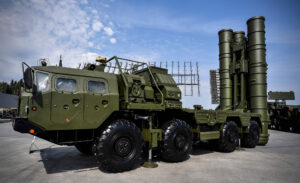
Zafar Iqbal Yousafzai
The deployment of the S-400 missile defense system by India has provided for a new debate on whether the US will sanction India or not. And how this move will affect the South Asian strategic environment? In 2018, the Modi-led BJP government inked a deal of FIVE S-400 units with Russia worth $5.5 billion. This deal shows India has yet a close cooperation and military ties with Moscow. This move is an unbalancing act for South Asia and especially Pakistan which lacks this sophisticated technology. When Turkey acquired the S-400 missile defense system, the Trump administration last year sanctioned Turkey. In 2017, the US Congress passed Countering America’s Adversary’s Through Sanctions Act (CAATSA) following a tense domestic situation created by the revelations of the Russian interference in the US Presidential elections.
When India signed the deal in 2018, the then US Secretary of State James Mattis argued for an exception to India, having non-aligned status in mind. Any country which purchases major defense equipment from Russia will face punitive sanctions. It aims at preventing Russia from supplying its weapons technology to the world. However, India is a member of QUAD, the new Indo-Pacific security partnership which keeps India close to the US and other major powers. Similarly, Washington considers New Delhi as an integral player in the Indo-Pacific. In such a situation, it’s unlikely that Washington will go for sanctioning India. Washington is nourishing India to keep China engaged in the region or somehow counterbalance it.
However, policymakers in Washington are divided over a waiver to India from CAATSA despite strong support for India in the US Senate. The US sees India as a counterforce to China and the former is deploying a missile defense system on its border with China and Pakistan. Hence, sanctioning a counterforce of an enemy is an inappropriate action on the part of Washington. Moreover, the US cannot ignore its billion dollars arms sales to India. The Indian arms purchase from the US last year rose to $3.4 billion. Besides, India has purchased Rafael fighter jets from France and has a Drone deal with Israel made this year in September.
On the contrary, if the US does not waive off the CATSAA sanctions, it would certainly weaken the India-US partnership in the Indo-Pacific and will have a huge impact on QUAD. Containing China, one of the main aims of QUAD could be undermined if any rift emerges between QUAD members. Though there could be reservations by Australia and Japan on the procurement of the S-400 system by India, however, these countries also see India as a counterbalance of China.
Likewise, the formation of AUKUS further heated the debate of India’s purchase of S-400 from Russia. Though Biden has reiterated to enhance its alliances and partnerships, its relations are souring with France, an old partner. Furthermore, the US sudden withdrawal from Afghanistan and the return of the Taliban to power has questioned the US global role as a guarantor of security. Similarly, any waiver to India from US sanctions will further question the US role and commitment to regional security among its allies.
Though India is important for the US, however, completely ignoring any obvious and serious issue in the shape of a waiver to India from CATSAA will further damage the US global position as a responsible state. India is looking to strengthen its clout in the region and make itself a rising power in the Indo-Pacific. Though India is a part of QUAD and Washington needs it as a counterforce to China, any over weightage to India will affect the US global image in addition to accelerating arms race in the region as Pakistan will check these developments and will try to balance India in defense capabilities. Any extra mile step by the US in favor of India will irritate Pakistan and it will have a huge impact on the US-Pakistan relations.
Zafar Iqbal Yousafzai is Senior Research Associate at Strategic Vision Institute, Islamabad.
